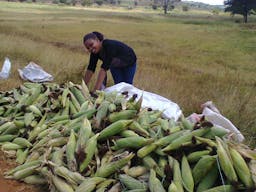TRADITION VS TECHNOLOGY
Jan 21, 2015
First story
Been a farmer myself and a volunteer as a empowerment coordinator for a women's groups based in kenya.The agriculture sector is dominated by small scale farmers of whom majority are women.The land they farm on is owned by their husbands who are responsible for decision making and the planning of farming activities while women have little authority and have to seek their husband's permission before they commit family resources or make decisions.
Majority of women farmers in the rural areas have joined women's groups which act as a venue for them to voice their concerns,deal with their problems and increase their confidence.They also promote income-generating activities for women as a vital source of household food security.
Majority of these groups are women specific looking at women as victims and ignoring their relations with men.
To close gender gaps in the agriculture sector,these women group should provide a platform for men to be involved.Both women and men should be viewed as the agents and beneficiaries of change.In an african society where land is owned and controlled by men,the involvement of men in these forum will be essential for them to understand women's right in ownership of land.They will also come to appreciate women input in the agriculture sector.
Since the introduction of 'family farmers' in my community there has been tremedous change in closing the gender gaps in agriculture.Its not been easy convincing the men ,proper communication channels had to be used.We first approched the chief and the community elders explained to them the importance of women's groups,issues women farmers are going through(especially land ownership and domestic violence in the homes),the importance of bringing together men farmers(land owners) and women farmers(mostly the labourers).Thereafter we met with the extension officers who arranged for us a meeting with the land owners.The first meeting was intense ,the women were afraid to voice their concern for fear of domestic violence back at home.We resorted to do house visits together with extension officers and these lead to a second meeting which was successful.
Family farming has lead to increase in production and sharing of knowledge especially new technologies in farming that were owned and controlled by men farmers.The men farmers are also turning to new crop production instead of the normal maize and beans that they demanded their women to plant in their lands,they have welcomed the production of fruit farming like melons which do well in ukambani.
Integrating new ict tools such as mobile-phone sms has been a challenge due to the illetracy levels in the community.the women prefer listening to radio because it is transmitted in their own vernacular languge(kamba language). Their husbands are not always at home to teach them how to use cell phones to gain information about the market prices.
We have started ' youths in farming' initiative to facilitate the use of ICT in the homesteads.we still in the mobilization stage will let you know how these turns out.
My one question about ICT will it embrace the indigenous knowledge of women in food security for example in my community
A)during drought the women bury pumpkin in the ground as a means of food preservation method.
B)After harvesting maize the women select specific seeds to be used in the next planting season.
Will ICT bring along technology that my community cannot afford?




